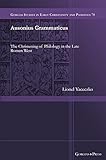Ausonius Grammaticus : The Christening of Philology in the Late Roman West / Lionel Yaceczko.
Material type: TextSeries: Gorgias Studies in Early Christianity and Patristics ; 78Publisher: Piscataway, NJ : Gorgias Press, [2021]Copyright date: ©2021Description: 1 online resource (253 p.)Content type:
TextSeries: Gorgias Studies in Early Christianity and Patristics ; 78Publisher: Piscataway, NJ : Gorgias Press, [2021]Copyright date: ©2021Description: 1 online resource (253 p.)Content type: - 9781463242800
- 9781463242817
- 871/.01 23
- PA6223 .Y33 2021
- online - DeGruyter
| Item type | Current library | Call number | URL | Status | Notes | Barcode | |
|---|---|---|---|---|---|---|---|
 eBook
eBook
|
Biblioteca "Angelicum" Pont. Univ. S.Tommaso d'Aquino Nuvola online | online - DeGruyter (Browse shelf(Opens below)) | Online access | Not for loan (Accesso limitato) | Accesso per gli utenti autorizzati / Access for authorized users | (dgr)9781463242817 |
Frontmatter -- TABLE OF CONTENTS -- LIST OF ILLUSTRATIONS -- PREFACE -- Chapter One. Introduction: Ausonius, Biography, and Personal Poetry in the Fourth Century -- Chapter Two. New Wine in Old Wineskins: Grammar, Rhetoric, and the Establishment of a Christian Culture -- Chapter Three. Ausonius of Bordeaux: Old Wine in Old Wineskins -- Chapter Four. Ausonius of Trier: The Mosella as Poetry of Court and Campaign -- Chapter Five. Ausonius of Rome: The Cupido Cruciatus as Personal Poetry in the Classical Tradition -- Chapter Six. Iugum Discutimus: Ausonius, Paulinus, and Henri Irénée Marrou -- Conclusion. From φιλόλογοι to θεολόγοι: Word-lovers to Worshipers of the Word -- Bibliography -- Index
restricted access online access with authorization star
http://purl.org/coar/access_right/c_16ec
The present volume describes the rich and complex world in which Ausonius (c. 310–395) lived and worked, from his humble beginnings as a schoolteacher in Bordeaux, to the heights of his influence as quaestor to the Emperor Gratian, at a time of unsettling social and religious change. As a teacher and poet Ausonius adhered to the traditions of classical paideia, standing in contrast to the Fathers of the Church, e.g., Jerome, Augustine, and Paulinus of Nola, who were emboldened by the legalization, then the imposition, of Christianity in the course of the fourth century. For this position he was labeled by the 20th-century scholar Henri-Irénée Marrou a symbol of decadence. Guided by Marrou’s critical insights to both his own time and place and that of Ausonius, this book proposes a hermeneutic for reading Ausonius as both a fourth-century poet and a fascinating mirror for his 20th-century counterparts.
Mode of access: Internet via World Wide Web.
In English.
Description based on online resource; title from PDF title page (publisher's Web site, viewed 01. Dez 2022)


